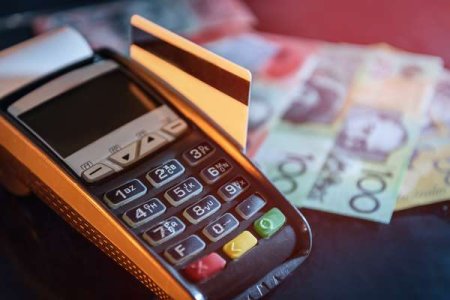Slash your expenses with this tradie's genius trick to dodge annoying $10 fees!
- Replies 15
In a world where every penny counts, especially for those of us enjoying the golden years on a fixed income, it's crucial to find ways to stretch our dollars further.
One Aussie tradie has shared a simple yet effective trick that could save you from unnecessary surcharges that add up over time.
With the cost of living on the rise, every little saving can make a significant difference to our wallets.
An Australian tradesman has shared how he saved money using a lesser-known technique when making a large purchase with his card.
Recently, card surcharges have gained attention following questioning of the CEOs of the major banks about whether they should remain in Australia.
The problem is estimated to cost Australians between $960.26 million and $4 billion annually, but Ben Smith said he discovered a method to lessen this expense.

The Melbourne resident was surprised by the additional charge he faced for a car service when paying with his card.
‘I went to pay for a car service, which was roughly like $550,’ he shared.
‘I went to tap my card, and the lady behind the desk just said to me, “Don't do that because you'll be slugged with the service charge.”’
Mr Smith initially wasn’t worried, assuming the charge would be under a dollar; however, he was informed that the surcharge was a percentage of the total cost, and since the car service was expensive, the fee amounted to over $10.
The staff member advised him to use the EFTPOS system, which had a significantly lower fee of around $2.
The carpenter remarked on how strikingly different the costs could be just by choosing between inserting or tapping his card.
He shared a video on social media detailing his experience and was astonished by the number of people who were also unaware of this issue.
‘A lot of the people on there basically said “I had no idea that this was a thing,” which is crazy because it's a subtle charge that no one would ever really think about,’ Mr Smith said.
As the cost-of-living crisis continues to strain Australians' finances, small surcharges can accumulate significantly.
An analysis of Reserve Bank of Australia (RBA) data by the ABC revealed these fees cost Australians approximately $960.26 million annually.
During a parliamentary inquiry, NAB's Andrew Irvine acknowledged the need to review card surcharging given the widespread use of digital payments over cash.
‘It's possible that surcharging was warranted over 20 years ago, but I think it behooves us to ask whether it still serves its purpose,’ he stated.
‘It just adds to [the] confusion. It means I don't know what the price of a good is that I'm buying, and I don't like it.’
He recalled encountering some ‘outrageous’ surcharges as high as 10 per cent, significantly above the typical 1-2 per cent fee associated with using a credit or debit card.
Westpac CEO Peter King also remarked that the current system feels like the Wild West and often fails to meet basic expectations.
‘What we have is some merchants are charging fees above their cost, as there is no enforcement of the rules,’ he said.
Other Australians argued that card surcharging has gotten out of hand and should be prohibited.
‘It's a pain when businesses want payment by card, then tack on the card surcharge on top of the purchase price,’ one person lamented.
‘I say incorporate the cost into the item or service provided. Don’t add the transaction charge afterwards,’ another suggested.
‘Massive rort,’ a third added.
Labor MP Jerome Laxale has led a campaign for fee-free digital payments, also calling the current system a ‘rort’.
‘I question why we are all being charged fees at all. Cash is fee-free to use, so should digital,’ he argued.
‘The RBA currently provides fee-free bank-to-bank fund transfers in an instant.’
‘Be it through Osko, PayID, scanning a QR code or new rules to open up Apple or Google wallets, unlocking the potential of the New Payments Platform is the answer to this $4 billion nightmare,’ he added.
The Reserve Bank estimated that Visa and Mastercard credit card payments typically incur costs of 1 to 1.5 per cent.
For Visa and Mastercard debit card payments, the cost is between 0.5 and 1 per cent, while EFTPOS payments cost less than 0.5 per cent.
Some payment terminals may charge over 2 per cent for card payments, and certain businesses apply even higher surcharges.
These fees are charged by banks or payment providers for processing card transactions, and businesses can either absorb these costs or pass them on to customers.
Most debit cards can be processed either through the EFTPOS system by inserting the card or via the Debit Mastercard or Visa Debit networks.
‘When a customer makes a contactless payment by tapping their dual-network debit card on a terminal, the transaction is automatically routed to the default network programmed on the card, which is typically the Debit Mastercard or Visa Debit network,’ he explained.
‘These international networks are generally more expensive for merchants than the EFTPOS network.’
Mr Smith noted that his discovery has altered how he uses his cards.
‘The bigger chains like Woolworths, McDonald's, and that sort of stuff, they don't pass the charge on,’ he said.
‘So if it's a big company, I still tap [my card] as they absorb the cost. But if it's anything small, I always now insert my card and just put my PIN in.’
Mr Smith’s experience highlights a growing concern among Australians about hidden fees and surcharges.
As more people become aware of tricks to avoid these additional costs, the broader issue of managing card-related expenses remains pressing.
This shift in awareness is particularly relevant given the rising frustrations over the hidden fees associated with cashless transactions, which continue to challenge many Australians.
For those facing similar frustrations, understanding these hidden costs and exploring ways to manage them effectively is more crucial than ever.
 Have you encountered similar surcharges? Do you have any other tips for avoiding these pesky fees? Share your stories and advice in the comments below!
Have you encountered similar surcharges? Do you have any other tips for avoiding these pesky fees? Share your stories and advice in the comments below!
One Aussie tradie has shared a simple yet effective trick that could save you from unnecessary surcharges that add up over time.
With the cost of living on the rise, every little saving can make a significant difference to our wallets.
An Australian tradesman has shared how he saved money using a lesser-known technique when making a large purchase with his card.
Recently, card surcharges have gained attention following questioning of the CEOs of the major banks about whether they should remain in Australia.
The problem is estimated to cost Australians between $960.26 million and $4 billion annually, but Ben Smith said he discovered a method to lessen this expense.

An Aussie tradie shared a tip to avoid higher card surcharges by using EFTPOS instead of contactless payments. Credit: Shutterstock
The Melbourne resident was surprised by the additional charge he faced for a car service when paying with his card.
‘I went to pay for a car service, which was roughly like $550,’ he shared.
‘I went to tap my card, and the lady behind the desk just said to me, “Don't do that because you'll be slugged with the service charge.”’
Mr Smith initially wasn’t worried, assuming the charge would be under a dollar; however, he was informed that the surcharge was a percentage of the total cost, and since the car service was expensive, the fee amounted to over $10.
The staff member advised him to use the EFTPOS system, which had a significantly lower fee of around $2.
The carpenter remarked on how strikingly different the costs could be just by choosing between inserting or tapping his card.
He shared a video on social media detailing his experience and was astonished by the number of people who were also unaware of this issue.
‘A lot of the people on there basically said “I had no idea that this was a thing,” which is crazy because it's a subtle charge that no one would ever really think about,’ Mr Smith said.
As the cost-of-living crisis continues to strain Australians' finances, small surcharges can accumulate significantly.
An analysis of Reserve Bank of Australia (RBA) data by the ABC revealed these fees cost Australians approximately $960.26 million annually.
During a parliamentary inquiry, NAB's Andrew Irvine acknowledged the need to review card surcharging given the widespread use of digital payments over cash.
‘It's possible that surcharging was warranted over 20 years ago, but I think it behooves us to ask whether it still serves its purpose,’ he stated.
‘It just adds to [the] confusion. It means I don't know what the price of a good is that I'm buying, and I don't like it.’
He recalled encountering some ‘outrageous’ surcharges as high as 10 per cent, significantly above the typical 1-2 per cent fee associated with using a credit or debit card.
Westpac CEO Peter King also remarked that the current system feels like the Wild West and often fails to meet basic expectations.
‘What we have is some merchants are charging fees above their cost, as there is no enforcement of the rules,’ he said.
Other Australians argued that card surcharging has gotten out of hand and should be prohibited.
‘It's a pain when businesses want payment by card, then tack on the card surcharge on top of the purchase price,’ one person lamented.
‘I say incorporate the cost into the item or service provided. Don’t add the transaction charge afterwards,’ another suggested.
‘Massive rort,’ a third added.
Labor MP Jerome Laxale has led a campaign for fee-free digital payments, also calling the current system a ‘rort’.
‘I question why we are all being charged fees at all. Cash is fee-free to use, so should digital,’ he argued.
‘The RBA currently provides fee-free bank-to-bank fund transfers in an instant.’
‘Be it through Osko, PayID, scanning a QR code or new rules to open up Apple or Google wallets, unlocking the potential of the New Payments Platform is the answer to this $4 billion nightmare,’ he added.
The Reserve Bank estimated that Visa and Mastercard credit card payments typically incur costs of 1 to 1.5 per cent.
For Visa and Mastercard debit card payments, the cost is between 0.5 and 1 per cent, while EFTPOS payments cost less than 0.5 per cent.
Some payment terminals may charge over 2 per cent for card payments, and certain businesses apply even higher surcharges.
These fees are charged by banks or payment providers for processing card transactions, and businesses can either absorb these costs or pass them on to customers.
Most debit cards can be processed either through the EFTPOS system by inserting the card or via the Debit Mastercard or Visa Debit networks.
‘When a customer makes a contactless payment by tapping their dual-network debit card on a terminal, the transaction is automatically routed to the default network programmed on the card, which is typically the Debit Mastercard or Visa Debit network,’ he explained.
‘These international networks are generally more expensive for merchants than the EFTPOS network.’
Mr Smith noted that his discovery has altered how he uses his cards.
‘The bigger chains like Woolworths, McDonald's, and that sort of stuff, they don't pass the charge on,’ he said.
‘So if it's a big company, I still tap [my card] as they absorb the cost. But if it's anything small, I always now insert my card and just put my PIN in.’
Mr Smith’s experience highlights a growing concern among Australians about hidden fees and surcharges.
As more people become aware of tricks to avoid these additional costs, the broader issue of managing card-related expenses remains pressing.
This shift in awareness is particularly relevant given the rising frustrations over the hidden fees associated with cashless transactions, which continue to challenge many Australians.
For those facing similar frustrations, understanding these hidden costs and exploring ways to manage them effectively is more crucial than ever.
Key Takeaways
- An Aussie tradie shared a tip to avoid higher card surcharges by using the EFTPOS system instead of contactless payments.
- The tradie, Ben Smith, found out he could save on a surcharge while paying for a car service, paying around $2 with EFTPOS instead of over $10 with card tap.
- High card surcharges are a contentious issue in Australia, with bank CEOs and the RBA acknowledging the need for a review.
- Australians were encouraged to consider different payment methods, such as inserting their card and using a PIN, especially at smaller businesses, to minimise surcharges.







